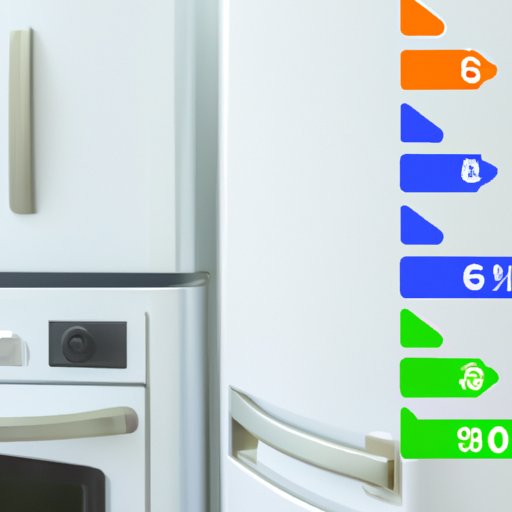Introduction
When it comes to running household appliances, most people understand that they require electricity to operate. But many are not familiar with the specific details of appliance power consumption – such as how many amps does a refrigerator use? This article will explore the power consumption of refrigerators and how to calculate the amps used. We’ll also examine refrigerator energy efficiency, the different types of amps, and tips for reducing refrigerator electricity usage.

Exploring the Power Consumption of Refrigerators
Before we can answer the question of “how many amps does a refrigerator use?”, we need to understand how power consumption is measured. The two main measurements of power consumption are wattage (W) and amperage (A). Wattage is a measure of electrical power, while amperage is a measure of the amount of electrical current flowing through an appliance. Most appliances are rated in watts, but in order to calculate the amperage, you must know the voltage of the appliance.
When it comes to the power consumption of refrigerators, there are several factors that can affect the amount of electricity used. This includes the size of the refrigerator, the type of compressor used, and whether or not the refrigerator has an ice maker or water dispenser. Additionally, the age of the refrigerator also plays a role in how much electricity it consumes.
Understanding Refrigerator Wattage and Amperage
In order to calculate the amperage used by a refrigerator, you must first determine its wattage. For example, a typical refrigerator will have a wattage rating of around 500-750 watts. To convert this to amperage, you must know the voltage of the appliance. Most refrigerators operate on 120 volts, so if our example refrigerator has a wattage rating of 750 watts, then the amperage would be 6.25 amps (750 watts/120 volts = 6.25 amps).
It is important to note that the wattage and amperage ratings of a refrigerator can vary depending on the model and make. If you are unsure of the wattage and amperage of your refrigerator, you should consult the manufacturer’s manual or contact the manufacturer directly.
How to Calculate the Amps Used by Your Refrigerator
While knowing the wattage and amperage ratings of a refrigerator can give you an idea of how much electricity it consumes, the best way to determine the actual amount of electricity used is to measure it directly. There are two main ways to do this – using a multimeter or a Kill-a-Watt meter.
A multimeter is a device used to measure electrical current, voltage, and resistance. To measure the amperage used by a refrigerator, you will need to connect the multimeter to the appliance’s power cord and set it to the appropriate setting. Once you have done this, you can take readings of the appliance’s current draw.
Alternatively, you can use a Kill-a-Watt meter to measure appliance usage. These devices plug into the wall outlet and measure the amount of electricity being used by your refrigerator. They will also provide you with information about the wattage and amperage used by the appliance.

An Overview of Refrigerator Electricity Usage
Refrigerators use different types of amps depending on their design. The two main types are single phase and three phase. Single phase refrigerators use alternating current (AC) and are typically found in residential homes. On the other hand, three phase refrigerators use direct current (DC) and are usually found in industrial settings.
The type of amp used by a refrigerator can have both advantages and disadvantages. For example, single phase refrigerators tend to be more energy efficient, while three phase refrigerators may be more powerful. Additionally, three phase refrigerators are typically more expensive than single phase refrigerators.
Refrigerator Energy Efficiency: What You Need to Know
Refrigerator energy efficiency is determined by several factors, including the type of refrigerator, the age of the refrigerator, and the features it offers. Newer models are typically more energy efficient than older models, and those with energy-saving features such as LED lighting and adjustable thermostats can help reduce energy consumption.
Common challenges to refrigerator energy efficiency include improper maintenance and incorrect temperature settings. If the refrigerator is not cleaned regularly and the temperature is not set correctly, it can lead to increased energy usage. Additionally, leaving the door open too long or storing too many items inside the refrigerator can also increase energy usage.

Tips for Reducing Refrigerator Electricity Usage
There are several ways to reduce the amount of electricity used by a refrigerator. Unplugging or turning off appliances when not in use is one of the easiest and most effective ways to conserve energy. Additionally, cleaning the coils and condensers regularly can help improve efficiency, as can adjusting the temperature settings.
Finally, replacing older refrigerators with newer, energy-efficient models can drastically reduce electricity usage. Look for models labeled with the ENERGY STAR® label, which indicates that the refrigerator meets the highest standards for energy efficiency.
Conclusion
Asking “how many amps does a refrigerator use?” is an important step in understanding appliance power consumption. By understanding the wattage and amperage ratings of a refrigerator, you can get an idea of how much electricity it consumes. Additionally, measuring the actual electricity usage with a multimeter or Kill-a-Watt meter can help you determine the exact amount of electricity used. Finally, understanding refrigerator energy efficiency and implementing simple energy-saving measures can help reduce electricity consumption.


